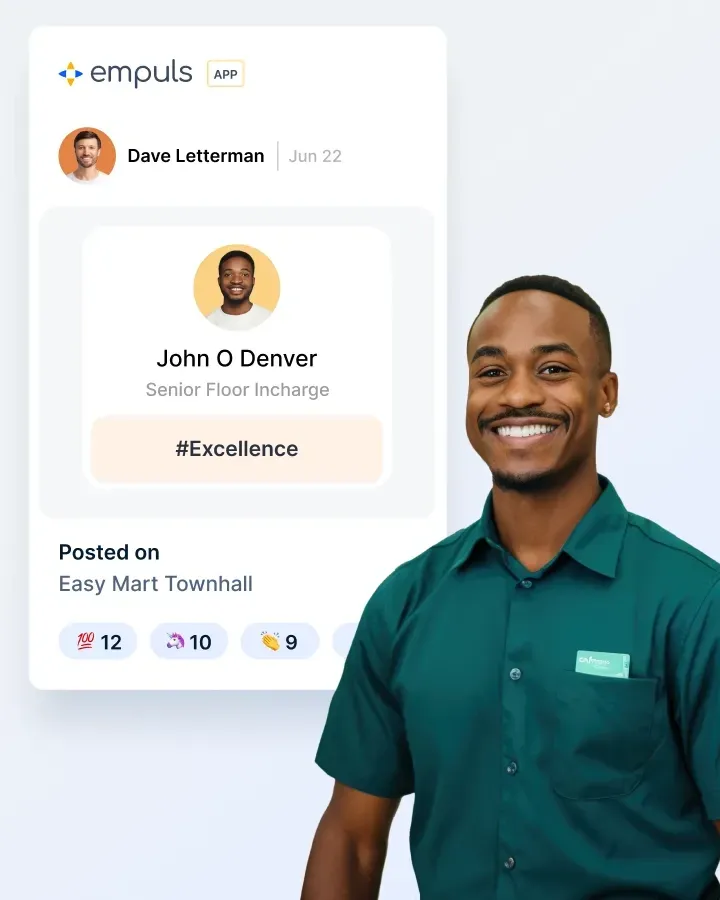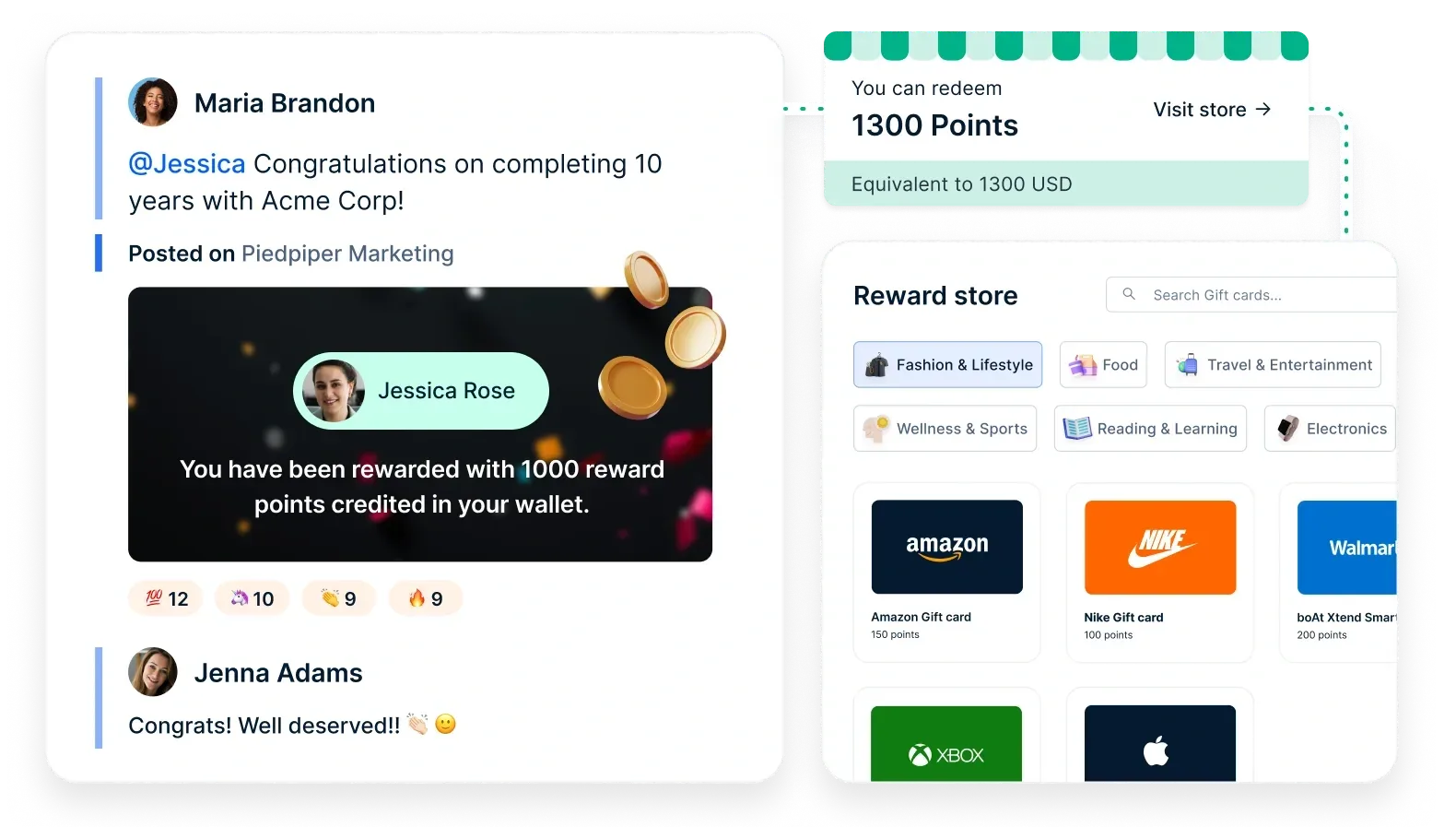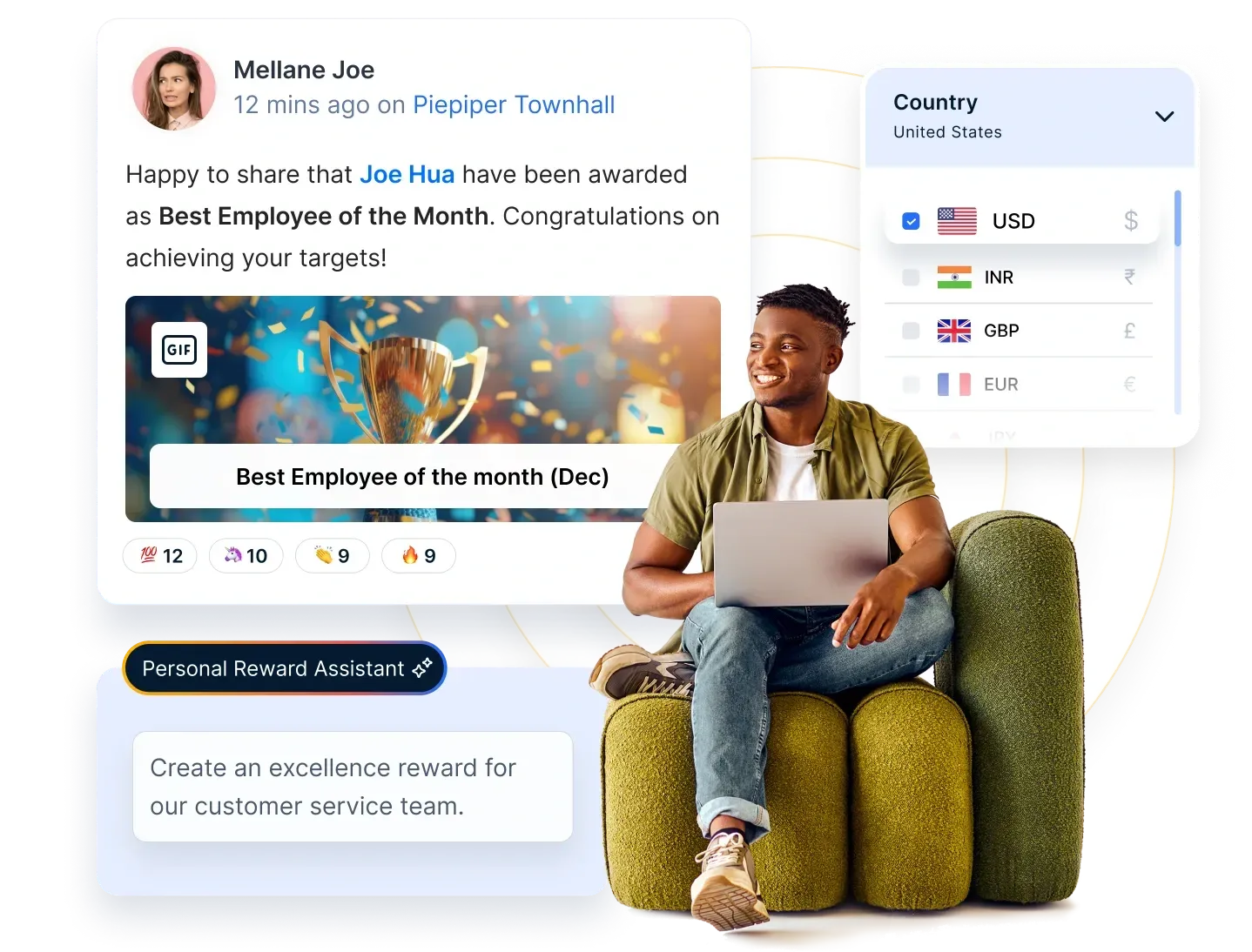Compromiso de los empleados en el sector minorista: 10 estrategias para mantener altas sus estanterías y su ánimo
Retail employees are crucial in shaping customer experiences and driving sales. However, high turnover and disengagement remain significant challenges in the retail sector. This blog explores engaging retail employees, enhancing motivation, and building a committed workforce.
En esta página
- The importance of employee engagement in the retail industry
- Common challenges in the retail industry
- 10 Strategies for engaging and motivating retail employees
- 5 Companies with amazing retail employee engagement strategies and lessons to learn from them
- Elevate Engagement for Your Consumer Goods & Retail Workforce with Empuls
- How Empuls transforms employee engagement:
- Conclusión
Retail employees are the driving force behind any successful store. As the first point of contact for customers, their performance directly impacts customer satisfaction, sales, and brand reputation. Prioritizing employee engagement in the retail industry is essential, as motivated employees are 31% more productive and contribute to a 37% increase in sales, according to a study by the World Economic Forum.
Since front-line retail employees represent the brand and influence overall shopping experiences, fostering retail employee engagement should be a top priority. Research from the University of Oxford highlights that motivated retail employees are likelier to go the extra mile, provide exceptional customer service, and stay committed to their roles.
However, the retail sector faces one of the highest employee turnover rates, often exceeding 60% in the U.S, with some estimates reaching 100% for part-time retail workers. To combat this challenge, businesses must focus on how to engage retail employees through recognition programs, career development, and continuous feedback.
In this blog, we’ll explore effective strategies to boost employee motivation in the retail sector, ensuring your workforce remains engaged, productive, and dedicated to driving business success. Whether you're a retail manager or an employee, you’ll find valuable insights to create a thriving and motivated team.
The importance of employee engagement in the retail industry
Employee engagement in the retail industry is critical for delivering exceptional customer experiences and driving business success. Engaged employees are more motivated, productive, and committed to their roles, leading to higher sales, better customer interactions, and improved team morale.
Prioritizing retail employee engagement helps reduce turnover, enhance operational efficiency, and create a positive workplace culture. Effective strategies such as recognition programs, career development opportunities, and regular feedback can significantly boost employee motivation in the retail sector.
Investing in employee engagement in the retail sector ensures a more satisfied workforce, stronger brand loyalty, and long-term business growth.
Common challenges in the retail industry
The retail industry faces several workforce challenges impacting business performance and employee satisfaction. From long working hours to high turnover rates, these issues can lower employee motivation in the retail sector and affect customer experience. A strong retail employee engagement strategy is essential to motivate teams, reduce attrition, and improve workplace productivity.
1. Demanding & long hours
Retail employees work in fast-paced, high-pressure environments, often standing for long hours while handling customer inquiries, stocking shelves, and managing transactions. The physical and mental strain can lead to burnout and disengagement. A well-structured employee engagement in the retail industry approach, including recognition programs, wellness initiatives, and flexible scheduling, can help motivate employees and improve retention.
2. Communication challenges
With retail operations spanning multiple locations, ensuring consistent training, clear communication, and seamless team coordination is a significant challenge. Frontline employees may feel disconnected from leadership, impacting productivity and morale. Investing in digital communication tools, regular check-ins, and structured feedback loops fosters retail employee engagement, keeping staff informed, aligned, and motivated.
3. High turnover rates
The retail industry is known for high employee turnover, driven by seasonal hiring, temporary contracts, and a lack of career growth opportunities. Constantly replacing employees affects team stability, training costs, and customer service quality.
Creating a culture of recognition, growth opportunities, and incentives can boost employee motivation in the retail sector, leading to a more committed and engaged workforce.
4. Customer expectations and service pressure
Retail employees must handle diverse customer needs, complaints, and expectations daily, requiring patience, problem-solving, and strong interpersonal skills.
Employees may struggle to maintain high service standards without proper support and motivation. Continuous training, performance-based rewards, and a positive work culture help employees feel valued, engaged, and motivated to deliver excellent customer experiences.

Empower Your Retail Employees with Recognition & Feedback
Retail success starts with engaged employees. Celebrate achievements, gather real-time insights, and create a motivated workforce with Empuls. Strengthen team connections and boost retention with a seamless engagement platform.
10 Strategies for engaging and motivating retail employees

Motivating retail employees is crucial for providing excellent customer service, improving sales, and fostering a positive work environment. Here are some tried-and-true retail employee engagement strategies to motivate employees and ensure they remain engaged and productive.
1. Incentivos gamificados
Turn everyday tasks into a game or competition. Gamification leverages the natural desire for competition, achievement, and recognition. By setting up sales competitions, leaderboards, or rewards programs based on performance, employers can engage and motivate retail employees in a fun and interactive way.
Starbucks implemented the “Starbucks Rewards” program not only for customers but also for employees. Baristas can earn "stars" for up-selling products, displaying exemplary customer service, or completing training modules.
Coleccionar estrellas permite a los empleados alcanzar determinados niveles, lo que conlleva recompensas y reconocimiento, que pueden ser tanto intrínsecos como tangibles.
2. Oportunidades de aprendizaje y desarrollo continuos
Ofrezca oportunidades constantes para que los empleados aprendan, crezcan y avancen dentro de la empresa. Puede ser a través de sesiones de formación, talleres o incluso cursos que les ayuden a perfeccionar sus habilidades o a aprender otras nuevas.
Esto beneficia a la empresa porque los trabajadores están mejor cualificados y aumenta la moral y la motivación de los empleados, que se sienten valorados y ven una vía clara de crecimiento dentro de la organización.
Apple is well-known for its extensive employee training programs. New retail employees, or “Specialists”, start with a multi-day training where they learn about the company, its products, and the importance of customer service.
Apple no se limita a la formación sobre productos o ventas, sino que se centra en enriquecer las habilidades de comunicación y resolución de problemas de sus empleados, asegurándose de que puedan enfrentarse a diversas situaciones con los clientes. Este enfoque de aprendizaje continuo ayuda a los empleados a sentirse valorados y preparados, lo que aumenta su motivación y su fidelidad a la marca.
3. Programas de descuentos y beneficios para empleados
Los minoristas pueden hacer que sus empleados se sientan especiales y valorados ofreciéndoles descuentos en productos o programas de beneficios exclusivos. Esto motiva a los empleados al darles un interés personal en los productos que venden y fomentar una conexión y una lealtad más profundas hacia la marca.
The Gap and its subsidiaries, like Banana Republic and Old Navy, offer employees significant discounts on store merchandise. This kind of benefit incentivizes employees and makes them brand ambassadors, as they often wear or use the products they sell, building a more authentic connection with customers.
4. Retroalimentación abierta y toma de decisiones inclusiva
Los empleados suelen conocer de primera mano la realidad sobre el terreno y pueden aportar información valiosa sobre las operaciones, las preferencias de los clientes y las posibles mejoras.
Al crear un entorno en el que los empleados sientan que su opinión se valora y puede influir en las decisiones, los minoristas pueden aumentar la motivación y cultivar un sentimiento de propiedad entre el personal.
Nordstrom, a renowned name in the retail sector, has always upheld a culture of open communication. They encourage employees to share feedback and ideas regardless of their rank or role.
Esto ha dado lugar a diversas mejoras operativas y ha fomentado una cultura en la que los empleados se sienten realmente partícipes del éxito de la empresa.
5. Programas de reconocimiento entre iguales
Más allá del reconocimiento de arriba abajo, permitir que los compañeros se reconozcan y celebren entre sí puede fomentar un sentimiento de camaradería y motivación. Los empleados pueden nominar a sus compañeros para "Empleado de la semana/del mes" o utilizar un sistema de puntos en el que los compañeros pueden darse puntos entre sí por el trabajo en equipo, la excelencia en el servicio al cliente o las ideas innovadoras. Estos puntos pueden canjearse posteriormente por recompensas.
Empuls makes peer-to-peer recognition effortless by providing a seamless platform where employees can appreciate each other in real-time. With Empuls, teams can give recognition badges, share appreciation messages, and award points that contribute to a positive work culture.
This helps employees feel valued by leadership and their colleagues, reinforcing teamwork and boosting morale. The platform’s integration with workplace tools ensures that recognition becomes a natural part of daily interactions, making appreciation more frequent and meaningful.
6. Espacios de descanso creativos
Renovar la tradicional sala de descanso para convertirla en un espacio más relajante y atractivo puede ser una motivación única. Considera la posibilidad de introducir elementos como asientos cómodos, plantas, juegos de mesa o incluso una pequeña biblioteca.
La idea es ofrecer a los empleados un auténtico descanso mental que les rejuvenezca para el resto de su turno. Esto demuestra preocupación por su bienestar y también puede aumentar la moral y la productividad.
LUSH believes in the power of a comfortable and engaging workspace. Many of their retail locations have revamped traditional break rooms into spaces that reflect the brand’s fun and ethical identity.
Con colores vivos, asientos cómodos e incluso algo de "diversión y juegos", los empleados pueden desconectar, refrescarse y volver al trabajo con energías renovadas.
7. Oportunidades de formación cruzada
Permita que los empleados aprendan funciones que van más allá de la descripción de su puesto. Permitir que un cajero conozca el almacén o que un dependiente se adentre en el merchandising visual amplía sus conocimientos y rompe la monotonía de su trabajo diario.
Esta variedad puede revigorizar su pasión por el comercio minorista, proporcionarles una comprensión más amplia del negocio y ofrecerles posibles vías de promoción.
IKEA often rotates its employees through different departments. This approach ensures that staff members understand the company's operations comprehensively.
Los empleados lo agradecen, ya que añade variedad a sus funciones y les proporciona un conjunto de competencias más amplio, lo que hace que sus funciones laborales sean más dinámicas y satisfactorias.
8. Programas de crecimiento personal y bienestar
Reconociendo que el bienestar de un empleado afecta directamente a su rendimiento y motivación, ofrezca programas centrados en el crecimiento personal y el bienestar. Esto podría ir desde talleres sobre gestión del estrés, clases de yoga después de los turnos o incluso proporcionar recursos sobre planificación financiera.
Mostrando preocupación por el bienestar integral de los empleados, los minoristas pueden fomentar una mayor lealtad y motivación.
Patagonia, an outdoor clothing retailer, offers its employees unique benefits that underscore its commitment to well-being and personal growth. Among these are yoga classes, an on-site organic cafe, and even opportunities to take paid time off to volunteer.
Su interés por garantizar el bienestar de sus empleados ha creado una plantilla motivada y profundamente alineada con los valores de la empresa.
Wellness programs do more than support employees—they build engagement and loyalty. Empuls helps retailers create holistic wellness initiatives, from financial wellness resources to mental health support and fitness challenges. With seamless integration and automated incentives, Empuls makes wellness a core part of company culture, driving motivation, productivity, and retention.
9. Participar en recompensas por comentarios de "compradores misteriosos".
Implemente un programa de "comprador misterioso" en el que los empleados no sepan cuándo pueden estar sirviendo a un evaluador secreto. Una vez realizadas las evaluaciones, en lugar de centrarse únicamente en las áreas de mejora, ofrezca recompensas a los empleados o equipos que destaquen en estas evaluaciones.
Esperar un reconocimiento positivo de una evaluación desconocida puede motivar a los empleados a rendir al máximo de forma constante.
The British international sandwich shop chain, Pret A Manger, uses mystery shoppers to visit each store weekly. If a store receives an outstanding evaluation, every employee in that store gets a bonus. This approach encourages consistent excellent service and fosters a team spirit, as everyone benefits from the collective effort.
10. Poner en marcha "Proyectos Pasión"
Conceda a los empleados unas horas al mes para trabajar en un "proyecto de pasión" relacionado con el comercio minorista de su elección. Puede ser el diseño de un nuevo escaparate, la organización de un acto de ayuda a la comunidad o incluso la creación de una nueva campaña de marketing en la tienda.
Estos proyectos permiten a los empleados canalizar su creatividad, sentirse dueños de la empresa y contribuir directamente al ambiente de la tienda o a la reputación de la comunidad.
While not a traditional retail company, Google's famous "20% time" policy allowed employees to spend one day a week working on a project unrelated to their main job.
Esta política creó algunos de sus mejores productos, como Gmail. Los minoristas pueden adoptar un enfoque similar a menor escala, dejando que los empleados trabajen en proyectos que les apasionen y que puedan beneficiar a la tienda.
Estas estrategias únicas se centran en los aspectos más suaves de la motivación, que a menudo se pasan por alto, haciendo hincapié en el respeto mutuo entre compañeros y en auténticos descansos para rejuvenecer.
Al invertir en ellos, los minoristas pueden conseguir un modelo de motivación de los empleados más holístico, que aumente la satisfacción laboral y mejore el rendimiento.

Build a Thriving Retail Team with Empuls
Keep your employees motivated with meaningful rewards, actionable feedback, and a social intranet that fosters connection. Elevate engagement and reduce turnover today.
5 Companies with amazing retail employee engagement strategies and lessons to learn from them
Descubra cinco estrategias prácticas y probadas de algunas de las mejores empresas para impulsar el compromiso de los empleados en el sector minorista. Desde mejorar la comunicación y el reconocimiento hasta ofrecer oportunidades de crecimiento y conciliación de la vida laboral y personal, aprenda a crear una plantilla más motivada y productiva en su negocio minorista.
1. Arby's: Preocuparse por la felicidad de los empleados
Arby’s is a fast-food restaurant chain founded in 1964. During the early 2010s, Arby’s restaurant empire was drowning. Employees were quitting, customers weren’t returning, and the business vitals weren’t looking good.
Paul Brown was hired by Roark Capital in 2013 as the company's CEO despite having no experience in the restaurant business. It turns out that this is the exact reason why Brown was able to save Arby.
Since he didn’t have all the answers, he turned to the people who might — the employees. He rounded up the oldest employees and asked them one question: what would you do if you were me?
Esta pregunta obtuvo muchas respuestas que ayudaron a Brown y su equipo a descubrir dos problemas acuciantes:
- Los empleados no recibían la formación adecuada. Esto significaba que carecían de la información adecuada que les ayudaría a atender a sus clientes con eficacia.
- Arby's no se comunicaba con ellos lo suficiente, lo que hacía que los empleados se sintieran infravalorados.
Ambas razones impidieron que los clientes de Arby's obtuvieran el valor que buscaban, al tiempo que afectaron al equilibrio entre la vida laboral y personal de los empleados. En consecuencia, el compromiso de los empleados disminuyó, lo que afectó al rendimiento global de la marca.
Arby's lanzó un programa Brand Champ para ayudar a los empleados a entender los objetivos de Arby's y tener la oportunidad de entender los suyos.
Este programa anual de formación de empleados dota a éstos de las habilidades y conocimientos adecuados para ofrecer valor a sus clientes. Además, también ayuda a Arby's a comprender los objetivos personales y profesionales de sus empleados.
Como resultado, los empleados y Arby's pudieron entenderse, lo que permitió mejorar el equilibrio entre la vida laboral y personal.
Since its inception in 2013, nearly 400,000 team members have been trained through this program which kept the company profitably growing. Brown, with help from his employees, changed the tides which led to a consistent increase in Arby’s revenues since 2016.
The key lesson for retail business owners is to care about their most valuable asset — employees. It involves helping them understand your business goals, investing in them through dedicated training programs, recognizing their goals, and actively listening to feedback.
Gathering employee feedback can be challenging when you are short on time and human resources. Paul Brown himself traveled to 50+ locations to talk with his employees! Although such interactions are valuable, not every retailer can do that.
A better alternative here is to create detailed questionnaires using a form builder and send them to your employees via email or text. This will take minutes for you to set up, and will get feedback from all your employees in one place.
With the relevant data, you can take the proper steps to make your employees feel valued and promote a healthy work-life balance in the short and long run.
2. Nordstrom: El mítico manual del empleado
Customer service is a crucial aspect of retail business. Great customer service keeps customers returning with their friends and bad ones drive them away. Retail businesses, therefore, go far and wide to ensure that their in-store employees are treating their customers properly.
It is not uncommon for retailers to round up their new hires and explain to them the what's, whys, and hows of interacting with customers. Although this works for the major part, this strategy is flawed due to the following reasons:
- Alarga el proceso de formación de los empleados.
- La mayor parte de esta fase de la formación de los empleados consiste en buenos consejos genéricos que quizá ni siquiera necesiten.
- Las interacciones entre empleados y clientes suenan poco auténticas, ya que los primeros casi se ciñen a un guión.
Los retos anteriores a menudo conducen a un mal servicio al cliente, el efecto contrario al deseado.
Nordstrom, a luxury fashion retail chain that is known for great customer service, might have the answer.
Surprisingly, new employees don’t receive a list of strict guidelines to interact with customers effectively whenever they join the team. Instead, they are handed a 5” x 8” gray card that contains only one rule of Nordstrom for their employees:
El breve manual del empleado ayuda a Nordstrom a reducir los costes de formación y también permite a sus empleados dirigir las interacciones con los clientes según su mejor criterio. Esto también elimina la cultura de la microgestión, lo que se traduce en una cultura de trabajo saludable.
To sweeten the deal, Nordstrom gives employees a discount of 20% or 33% on a flat rate based on their designation. During festive seasons, the discount often increases by 10-20%, based on what the store managers decide.
Aunque no todas las empresas minoristas pueden reducir su manual del empleado a una simple norma, sin duda pueden acortarlo considerablemente si confían en que sus empleados harán su trabajo.
Este paso establecerá expectativas sencillas pero claras para sus empleados y hará que sus procedimientos internos sean coherentes, mejorando así el compromiso y la motivación de los empleados.
3. Wegmans: Invertir en los empleados
Ya hemos mencionado dos cosas que las empresas minoristas deben tener en cuenta: los empleados son un activo y hay que invertir en ellos.
Wegmans, an American supermarket chain, recognized the importance of investing in employees. The store managers at Wegmans adopted a bias for action and have successfully fostered a nurturing workplace.
Además, Wegmans invierte sistemáticamente más de 50 millones de dólares anuales en la formación y el desarrollo de sus empleados, independientemente de que los futuros objetivos profesionales de sus empleados coincidan con los objetivos empresariales de Wegman.
According to the 2021 Global Employee Engagement Study by Great Place To Work, 90% of Wegmans employees agree that it is a great place to work, compared to the national average of 57%.
An official from Wegmans explained in an interview how important customer satisfaction and retention is for them. To achieve that goal, it was important to put the employees first. They added, “in order to be a great place to shop, we must first be a great place to work.”
Aunque para la mayoría de los minoristas será un reto invertir en sus empleados a tal nivel, sin duda pueden adoptar las siguientes prácticas de Wegmans:
- Establezca procedimientos y protocolos con los que los empleados se sientan cómodos: Una buena forma de ponerlo en práctica es pedir a tus empleados que formen pequeños grupos y participen activamente en la creación de estos procedimientos.
- Asegúrese de que estos procedimientos sean coherentes para todos: Tratar a los empleados de la misma manera respetando sus posiciones en la empresa es crucial para alimentar el espíritu de equipo. Esto mejorará la colaboración dentro de la organización, lo que aumenta el compromiso de los empleados.
- Comparta las victorias con el equipo: Ya se trate de un aumento de las ventas, de la expansión del negocio o del aniversario laboral de alguien, aproveche estos momentos como oportunidades para reunir a sus empleados.
- Listen to employees' grievances and act: Employees coming forward with a complaint or a suggestion is excellent as it takes the guesswork out of where you need to invest. Besides, it shows that your team members are willing to help you improve the workplace.
The above methods of investing in employees bring them closer to your brand by increasing their involvement in your store’s success, increasing employee engagement and motivation.
4. Recreational Equipment Inc.: Más permisos retribuidos
Working in retail is challenging. Dealing with multiple customers, working for long hours with small breaks, and ensuring store policies are followed correctly are some of the many challenges that retail employees face daily.
If there is one thing that retail employees want it is more paid leave.
Recreational Equipment Inc. (REI) started by giving two more leaves to its employees than the industry standard to help them “go out and get inspired”. On holidays such as Thanksgiving and Black Friday when retail employees are busy, REI prefers to reward its employees with paid time off.
Recently, REI announced that they will also give paid leave to their employees to vote during the Presidential elections.
This allows employees to maintain a healthy work-life balance and inspires them to respect their employer and colleagues. By putting the employees’ happiness first, REI ranked #4 in the Fortune Best Workplaces in Retail 2020.
More paid leaves will increase employee happiness and morale, directly affecting work performance. A well-rested and rejuvenated employee is likelier to perform better than a tired employee under the same conditions.
Consequently, your employees will remain more engaged at work and will be motivated to deliver the best customer experiences.
Además de adoptar la estrategia de REI de dar más permisos retribuidos, puede ayudar a sus empleados a descansar más:
- Contratación de más empleados para reducir la carga de trabajo de los actuales.
- Introducir medias jornadas en determinadas épocas del año.
- Aumentar la duración de las pausas que hacen sus empleados en el trabajo.
5. Starbucks: Pagar con algo más que dinero
So far, we have shared examples that illustrate how retailers have improved their workplace by caring about their employees' happiness, providing them with the right training, respecting them, and giving them more time off.
Pero hay una forma que funciona mejor que todas: las ventajas.
Just like customer expectations, employee expectations in retail have evolved. Retailers now have to provide more than a steady paycheck and paid time off to ensure employee satisfaction.
Starbucks lo ha entendido y ha ido más allá para ofrecer a sus empleados las siguientes ventajas:
- Goodies and discounts: Each shift you can get up to four free drinks and a food item from the menu; every week you can take home a free bag of coffee, Tazo Tea, VIA Ready Brew packets, and a box of 12 K-Cups; and a 30% discount on anything whenever you shop from any Starbucks.
- Free tuition to Arizona State University: Part-time and full-time employees working at standalone Starbucks locations can get a 100% scholarship while pursuing an online bachelor’s degree at Arizona State University. You can choose from over 140 programs.
- Maternity leave: Mothers working at Starbucks stores who clock in over 20 hours/week are eligible to receive six weeks of paid time off. If they are working in Starbucks’ corporate offices, the paid time off is extended to 12 weeks.
- Savings plan for the future: You can start throwing money in Starbucks’ Future Roast 401(k) retirement plan after working for 90 days or more. The best benefit is Starbucks will match the first 5% of your contribution for each pay period!
- Pocket-friendly health benefits: Part-time and full-time employees who log in more than 20 hours/week and have been working for more than 90 days can choose their preferred medical health plan which also covers their dental and vision requirements.
Cuando se aprecia a los empleados a través de medios tangibles en lugar de una mera palmadita en la espalda, mejora su compromiso con el trabajo, su implicación con la organización y su motivación en el trabajo.
Although not all retailers can match Starbucks in terms of additional perks, they can surely increase their offerings for their employees. For instance, you can offer employee discounts, freebies, maternity leaves, and secure retirement plans.
Elevate Engagement for Your Consumer Goods & Retail Workforce with Empuls

Retail and consumer goods employees thrive on motivation, connection, and recognition. Yet, high turnover and disengagement remain common challenges. Empuls helps bridge this gap by fostering a culture where feedback, rewards, and community-driven engagement come together to create a motivated and loyal workforce.
How Empuls transforms employee engagement:
- ✔ Recognize & reward contributions: Celebrate milestones, achievements, and everyday wins with meaningful and tax-efficient rewards.
- ✔ Turn feedback into action: Gather real-time employee insights through automated surveys and use data-driven decisions to improve workplace experiences.
- ✔ Strengthen team connections: Build a sense of belonging with an interactive social intranet that keeps employees engaged, informed, and connected.
- ✔ Boost retention & performance: Empower employees with recognition programs that enhance motivation and loyalty in a fast-paced retail environment.
From frontline staff to corporate teams, Empuls creates an environment where employees feel valued and engaged—driving organizational performance and satisfaction. Connect with our engagement experts now!
Conclusión
Motivar a los empleados del comercio minorista es un proceso continuo que requiere una combinación de estrategias, como una comunicación clara, reconocimiento, formación, un entorno de trabajo positivo y una remuneración competitiva.
Al invertir en el bienestar y el crecimiento de sus empleados, puede crear un equipo de minoristas motivado y comprometido que contribuya al éxito de su empresa. Recuerde que los empleados motivados son más propensos a ofrecer un excelente servicio al cliente y a impulsar las ventas, lo que en última instancia beneficia a su cuenta de resultados.













